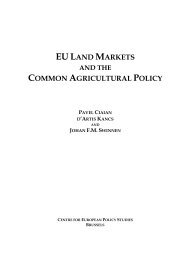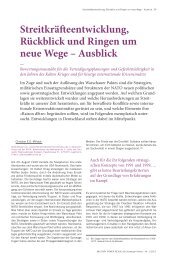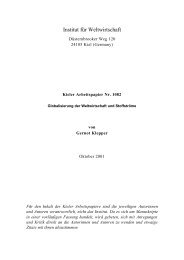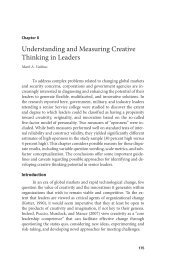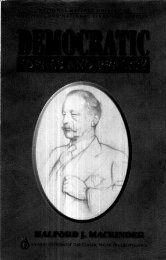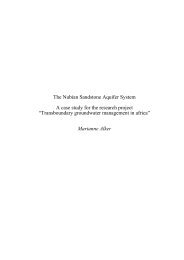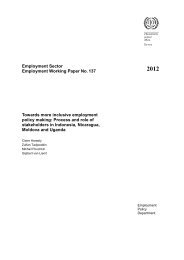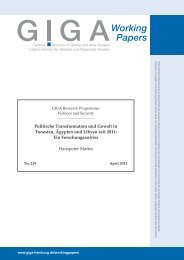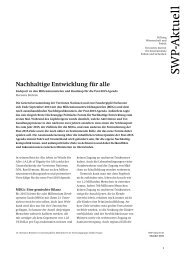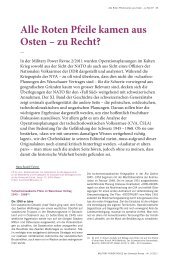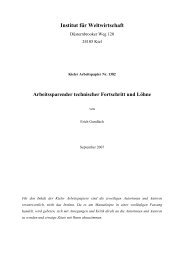Authoritarian Rule and Democracy in Africa: A Theoretical Discourse
Authoritarian Rule and Democracy in Africa: A Theoretical Discourse
Authoritarian Rule and Democracy in Africa: A Theoretical Discourse
You also want an ePaper? Increase the reach of your titles
YUMPU automatically turns print PDFs into web optimized ePapers that Google loves.
of work<strong>in</strong>g conditions. Industrial disputes are more often resolved by methods of co-optation<strong>and</strong> repression than by democratic persuasion <strong>and</strong> barga<strong>in</strong><strong>in</strong>g. 1The second mode of accumulation highlights the way dom<strong>in</strong>ant groups <strong>in</strong> the economy <strong>and</strong>society appropriate rent through the state. Transnational <strong>and</strong> local firms may comb<strong>in</strong>e theformal modes of surplus appropriation with the siphon<strong>in</strong>g of public resources. Neo-classicalpolitical economists associate economic distortions <strong>in</strong> develop<strong>in</strong>g economies with theemergence of powerful urban coalitions who use their privileged access to state resources toexploit rural communities (Bates, 1981; Lofchie, 1989). Rent-seek<strong>in</strong>g activities, it is argued,cause develop<strong>in</strong>g economies to operate at sub-optimal levels (Bhagwati, 1982; Buchanan,1980).Tornquist has analyzed, at the wider political context, the different types of rent-seek<strong>in</strong>gactivities employed by various socio-political groups <strong>in</strong> India <strong>and</strong> Indonesia <strong>and</strong> theirimplications for authoritarian <strong>and</strong> democratic forms of rule (Tornquist, 1988). Toyo <strong>and</strong> Iyayi,exam<strong>in</strong><strong>in</strong>g the phenomenon <strong>in</strong> Nigeria, demonstrate that rent capitalism, which they callprimitive accumulation, takes the form of contract <strong>in</strong>flation, the appropriation <strong>and</strong>valorization of l<strong>and</strong>, <strong>and</strong> the use of bureaucratic positions for corrupt enrichment (Toyo, 1985;Iyayi, 1986). Patron-client relations, sometimes ethnic based, but often cross-national, arebuilt <strong>in</strong>to the alliances for the control <strong>and</strong> adm<strong>in</strong>istration of state power. Ibrahim has shownhow the methods described by Toyo <strong>and</strong> Iyayi were used by the lead<strong>in</strong>g groups <strong>in</strong> the rul<strong>in</strong>gNational Party of Nigeria to consolidate their grip on the political system of Nigeria’s SecondRepublic (Ibrahim, 1988). The state became a central organ <strong>in</strong> private accumulation <strong>and</strong> classformation. It is <strong>in</strong> this sense that Ake talks about the over-politicization of <strong>Africa</strong>n economies(Ake, 1987). The state is subjected to non-Weberian values of irrationality, <strong>in</strong>efficiency <strong>and</strong>disorder. Constitutionalism <strong>and</strong> the rule of law, central to democratic politics, fails to takeroot <strong>in</strong> the body politic.The petty commodity sector presents a contradictory picture. Its authoritarian character isdiscussed ma<strong>in</strong>ly <strong>in</strong> the context of its <strong>in</strong>corporation <strong>in</strong>to the modern economy. I use theconcept of petty commodity production <strong>in</strong> a broad sense to cover activities <strong>in</strong> which producersare basically self-employed, rely on family or non-waged labour, <strong>and</strong> use rudimentary tools<strong>and</strong> skills to susta<strong>in</strong> their livelihood. These activities embody several complex social relations<strong>and</strong> straddle both urban <strong>and</strong> rural areas. They <strong>in</strong>clude peasant production <strong>and</strong> <strong>in</strong>formal sectoractivities. Colonial historiography traces the constra<strong>in</strong>ts on <strong>Africa</strong>n development to thetraditional values embedded <strong>in</strong> the social practices of the actors <strong>in</strong> these enterprises.A more sophisticated version of the thesis comb<strong>in</strong>es fragments of historical materialism withmodernization theory to highlight the resilience of the “peasant mode of production”, <strong>and</strong> theneed for a proper capitalist revolution to overcome the problems of underdevelopment,corruption <strong>and</strong> authoritarianism (Hyden, 1983). “Tribalism”, an impediment to democracy<strong>and</strong> accumulation, is understood to be a direct attribute of the “relations of affection”, rooted<strong>in</strong> “pre-capitalist” values <strong>and</strong> practices. The contemporary <strong>Africa</strong>n state is projected as apathetically poor modernizer as it has failed to “capture” the small-scale producers buried <strong>in</strong>these “relations of affection”.Other scholars <strong>and</strong> peasant-oriented activists contend that some of the essential values ofsmall-scale farm<strong>in</strong>g societies are conducive to the growth of a democratic culture <strong>and</strong> practice(Berg-Schlosser, 1985). Nyerere based his strategy of Ujamma, for <strong>in</strong>stance, on the“democratic” <strong>and</strong> growth potentials of peasant social relations (Nyerere, 1967). Informal1 I make no dist<strong>in</strong>ction between local <strong>and</strong> foreign capital <strong>in</strong> terms of the organizational practices oftheir enterprises <strong>and</strong> their policies toward labour. In fact, several studies have shown that <strong>in</strong>digenousfirms tend to be more contemptuous of the rights of workers to form labour unions. See, for <strong>in</strong>stance,Olukoshi, 1986.5



